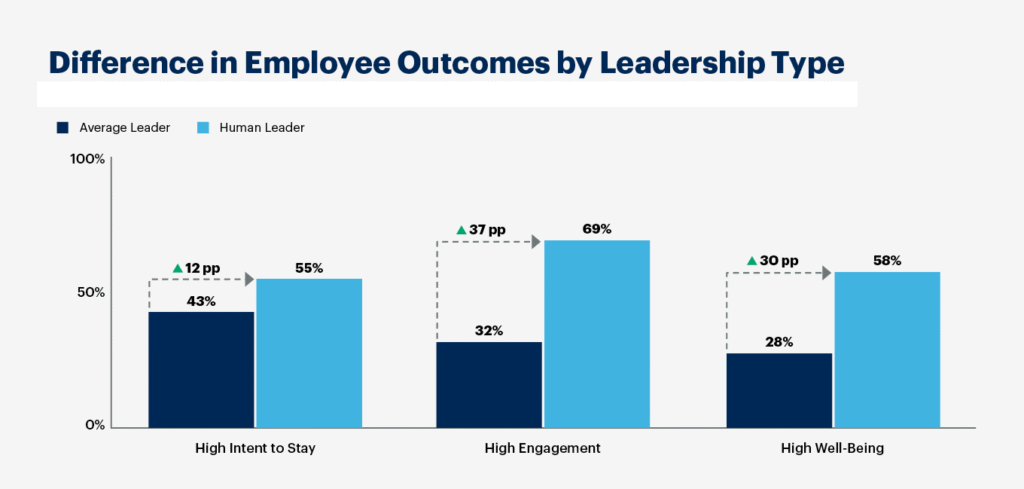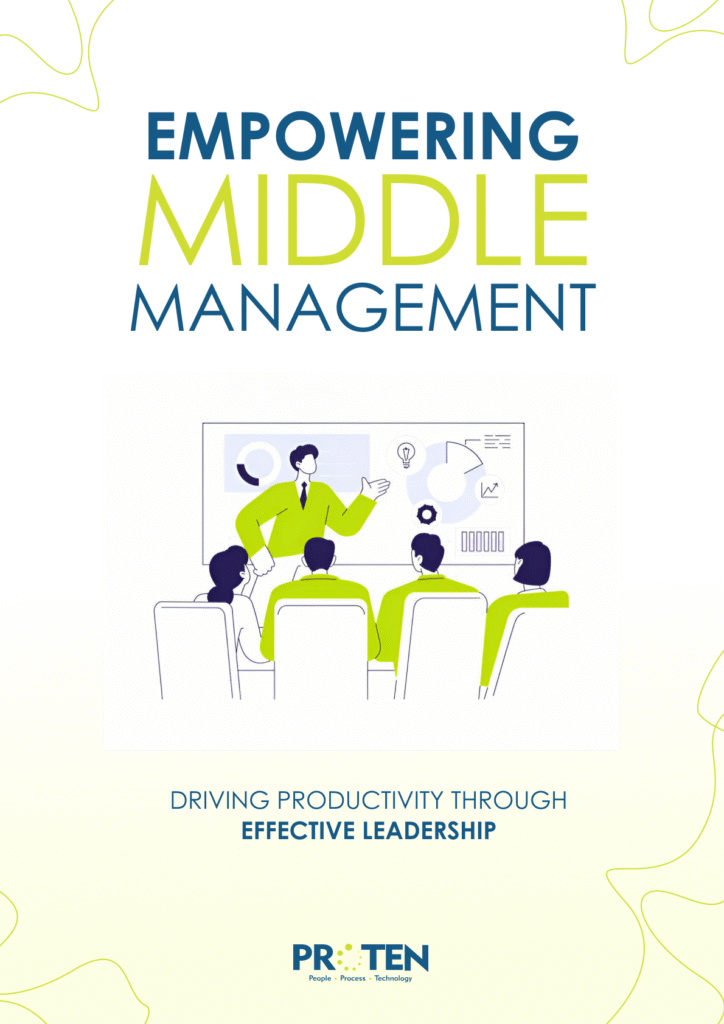Nigeria’s corporate environment is characterised by a hierarchical structure where middle managers hold significant influence over decision-making and operational workflows. According to intercultural studies, many business cultures emphasise deference to authority, with managers often adopting paternalistic and autocratic styles. This dynamic positions middle managers as critical conduits for translating organisational strategy into actionable outcomes. However, a lack of leadership training often leaves them ill-equipped to foster collaboration, delegate effectively, or inspire innovation, resulting in decision-making bottlenecks and reduced productivity.

Source: Researchgate
The level of productivity of teams hinges critically on the effectiveness of middle managers. Research highlights the importance of middle management in shaping organisational culture and performance. A Gallup study found that managers account for 70% of the variance in employee engagement, directly impacting productivity and retention.
This scenario analysis explores three potential outcomes of addressing the gaps in middle management through leadership training: a Best Case, where comprehensive training empowers managers to delegate and coach, significantly boosting team productivity; a Worst Case, where untrained managers resort to micromanagement, stifling initiative and lowering output; and a Moderate Case, where partial training yields marginal improvements due to inconsistent application.
Scenarios
Best Case: Empowered Managers Drive Productivity Through Delegation and Coaching
In this scenario, organisations invest in comprehensive leadership training programmes tailored to middle managers. These programmes focus on delegation, coaching, emotional intelligence, and inclusive leadership, aligning with modern workplace demands. Training incorporates practical tools which emphasise on-the-job application and habit formation. Managers learn to empower teams and align individual goals with organisational strategy, clearing decision-making bottlenecks and boosting productivity.

Source: Gartner
Outcomes:
- Increased Productivity: A Dale Carnegie study found that teams led by engaged and empowering leaders are significantly more likely to achieve organisational goals. In this scenario, productivity rises and this rise is driven by streamlined decision-making and enhanced team output.
- Improved Employee Engagement: Training fosters trust and collaboration, with a 36% increase in employees feeling supported by their leaders, as reported in modern leadership studies. Engaged employees contribute to a 46% improvement in productivity and retention, according to Arbinger.
- Cultural Transformation: Middle managers act as “architects of culture,” fostering psychological safety and innovation, as noted by Leaderonomics. This aligns with the organisation’s need for a dynamic, forward-thinking corporate environment to remain competitive.
Challenges:
- High initial costs of training programmes may deter small organisations.
- Cultural resistance to participative leadership by middle managers may slow adoption.
Worst Case: Untrained Managers Micromanage, Stifling Initiative and Output
In this scenario, organisations fail to invest in leadership training, leaving middle managers to rely on outdated, autocratic management styles prevalent in Nigeria’s traditional culture. Managers micromanage teams, centralise decision-making, and suppress employee initiative, leading to low morale, high turnover, and significant productivity losses.

Source: Thrivemyway
Outcomes:
- Declining Productivity: Micromanagement stifles innovation and slows decision-making, reducing productivity by an estimated 15–25%. A study on Nigerian SMEs found that autocratic leadership styles have an insignificant impact on organisational performance.
- Low Morale and Turnover: Toxic cultures driven by poor leadership are ten times more likely to cause turnover than compensation issues, according to LinkedIn data. In Nigeria, where 47% of employees report “quiet quitting” due to negative cultures, disengagement further erodes output.
- Increased Burnout: Employees experience a 44% higher incidence of moderate-to-severe burnout under micromanaging leaders, as reported by O.C. Tanner.
- Organisational Stagnation: Failure to address leadership gaps in middle management exacerbates the organisation’s competitiveness challenges, leading to stagnation in output and productivity.
Challenges:
- Entrenched cultural norms reinforce autocratic management, making change difficult without intervention by experts such as Proten International.
- Lack of awareness among senior leaders about the long-term costs of poor management practices.
Moderate Case: Partial Training Yields Marginal Productivity Gains
In this scenario, organisations implement limited or ad-hoc leadership training for middle managers, such as short workshops or generic online courses that are not specialised and targeted. While some managers improve their oversight and communication skills, inconsistent application and lack of follow-up limit the impact, resulting in modest productivity gains.
Outcomes:
- Modest Productivity Increase: Productivity rises by an estimated 5–10%, driven by improved oversight in some teams. A study on organisational change in Nigeria’s banking sector found that partial adoption of leadership changes had a statistically significant but limited impact on performance.
- Inconsistent Engagement: Only 54% of employees report feeling supported by their leaders in partially trained environments, limiting engagement gains.
- Cultural Stagnation: Without comprehensive training, middle managers struggle to foster a cohesive culture, with only 1 in 6 employees feeling connected to colleagues, as per Accenture.
Challenges:
- Limited training budgets restrict programme scope and duration.
- Inconsistent application due to varying manager commitment and cultural resistance.
Recommendations
- Invest in Comprehensive Training: Organisations should adopt long-term training and upskilling programmes (6–12 months) like the learning calendar from Proten’s Learning Academy, focusing on delegation, coaching, and emotional intelligence. These should include practical tools and on-the-job application to ensure lasting impact.
- Foster a Coaching Culture: Middle managers should be trained as coaches to empower employees, as coaching increases engagement and productivity.
- Leverage Technology: Use technological platforms and software to map personality types, analyse leadership gaps, and address those gaps, ensuring training aligns with organisational strategic needs.
- Monitor and Evaluate: Implement regular assessments to track training outcomes, using metrics like employee engagement and productivity.
Conclusion
Empowering middle managers through effective leadership tools is critical to driving productivity. Regardless of which leadership scenario is currently prevalent in your organisation, the Best Case scenario is the ideal position that every organisation should strive for. This scenario depicts how comprehensive training can transform managers into coaches and delegators, yielding significant productivity gains and fostering a dynamic organisational culture.
Conversely, the Worst Case highlights the risks of inaction, with micromanagement leading to disengagement and stagnation. The Moderate Case underscores the limitations of partial efforts, which fail to address systemic challenges. By investing in tailored, long-term effective leadership training, organisations can unlock the potential of middle management, aligning teams with their long-term strategic goals.
It is strongly recommended that organisations that want to drive productivity through effective leadership engage expert consultants who can help drive the initiative. This is where Proten International comes in. Proten International is a leading human resource and management consulting firm that can provide your organisation with the training and professional guidance needed to transform your middle managers into drivers of profit and growth. Contact us today to begin this journey.

